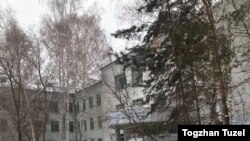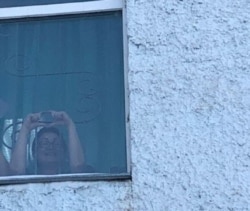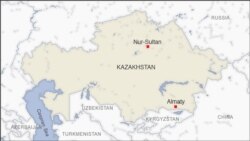For nearly three weeks Kazakhstan blogger Aigul Utepova was detained in a psychiatric clinic for “observation” after she wrote critical posts of the government on social media.
Utepova, who has over 8,000 followers on both her Facebook page and YouTube channel, had already been under house arrest since September when a court in Kazakhstan’s capital, Nur-Sultan, ordered that she be moved to the clinic, according to rights groups and her daughter.
The 50-year-old journalist, who until 2018 worked for the NewTimes.kz news agency, is accused of “participating in an extremist organization.”
The blogger’s daughter, Togzhan Tuzel, told VOA she believes authorities are punishing Utepova for commentary on social media about opposition movements such as the Democratic Choice of Kazakhstan (DVK) and Koshe Partiasy (Street Party), and for publishing articles on alleged “attempts by the government to manipulate” public opinion.
“It is not normal for hundreds of people to be persecuted in Kazakhstan every year on charges of extremism and terrorism, for speaking out peacefully on social media and participating in small street rallies,” Tuzel said, adding that dozens of activists are being prosecuted under the same criminal charges as her mother.
Two days before Utepova’s Dec. 11 release from the clinic, a court extended her house arrest until January 17. The journalist’s lawyer was presented with the order during an online court session, Tuzel said.
Freedom of expression is heavily curtailed in Kazakhstan, where authorities use accusations such as participating in or supporting extremist groups to target government critics or those who report favorably of political movements calling for reform, rights groups say. The country ranks 157 out of 180 countries on the Reporters Without Borders Press Freedom Index, where 1 is the most free.
Kazakhstan’s Ministry of Foreign Affairs did not respond to VOA’s request for comment.
Utepova has been released from the clinic. But Heather McGill, a Central Asia researcher at Amnesty International, says the journalist’s case is by no means an isolated incident. In 2019, blogger Ardak Ashym was ordered into psychiatric care for insulting a state official on social media.
The cases suggest Kazakhstan has not fully rid itself of the Soviet-era tactic of punitive psychiatry, McGill said, adding that “psychiatry can be misused to attempt to put pressure on critics of the government.”
A similar tactic has also been seen in Vietnam where authorities this year ordered Le Anh Hung, a VOA contributor and blogger, and Pham Chi Thanh, who covered politics and social issues on his blog, into psychiatric clinics over their critical comments and reporting.
Utepova’s lawyer Galym Nurpeisov told VOA that lately Kazakhstan's government has been pursuing journalists and bloggers for bringing up politics.
Yevgeniy Zhovtis, director of the human rights organization Kazakhstan International Bureau for Human Rights and Rule of Law, told VOA that authorities are tough on critics.
“There are many cases of pressure on the political opposition, independent journalists and bloggers, in particular supporters of opposition movements Democratic Choice of Kazakhstan and Koshe Partiasy,” Zhovtis said.
Zhovtis said he believes the accusations are just an excuse to punish dissidents.
The DVK is a political opposition movement founded by Mukhtar Ablyazov, a former minister and critic of the government who fled to Europe to avoid embezzlement charges that supporters say are politically motivated. A court banned the DVK for being an “extremist organization” in March 2018. The Koshe Partiasy, widely viewed by activists as the successor of DVK, was also deemed an “extremist organization” by Kazakh authorities in May.
Government officials say the groups propagate “the forcible change of Kazakhstan’s constitutional order” and are therefore extremist, but supporters say their goal is democratic reforms.
Authorities have a track record of targeting outspoken activists who criticize the government or its policies, by using vague and overbroad criminal charges, Mihra Rittmann, a Central Asia researcher at the New York-based Human Rights Watch, told VOA.
This year alone Kazakh authorities opened dozens of criminal cases on charges of participating in a banned extremist organization, the same charge Utepova is facing, Rittmann said.
“What constitutes ‘extremist’ actions or speech isn’t clearly defined in Kazakh law, allowing for authorities in Kazakhstan to invoke allegations of ‘extremism’ to try and silence critical voices,” Rittman said.
Fionnuala Ní Aoláin, the UN special rapporteur for protecting human rights while countering terrorism, has expressed serious concern about this issue.
After a visit to Kazakhstan in May 2019, Aoláin concluded that the broad definitions of “extremism” and “inciting discord” in Kazakh law “are used to unduly restrict freedoms of religion, expression, assembly and association.”
Maksym Sytnikov, advocacy officer at Warsaw-based Open Dialogue Foundation, which focuses on human rights in post-Soviet area, told VOA the international community should sanction any senior Kazakhstani officials found to be responsible for punitive psychiatry, political assassinations, and torture.
“The governments of democratic states should publicly condemn every case of political persecution and the lack of investigation into punitive psychiatry, torture and other gross violations by [Kazakhstan’s] law enforcement authorities,” Sytnikov said.







